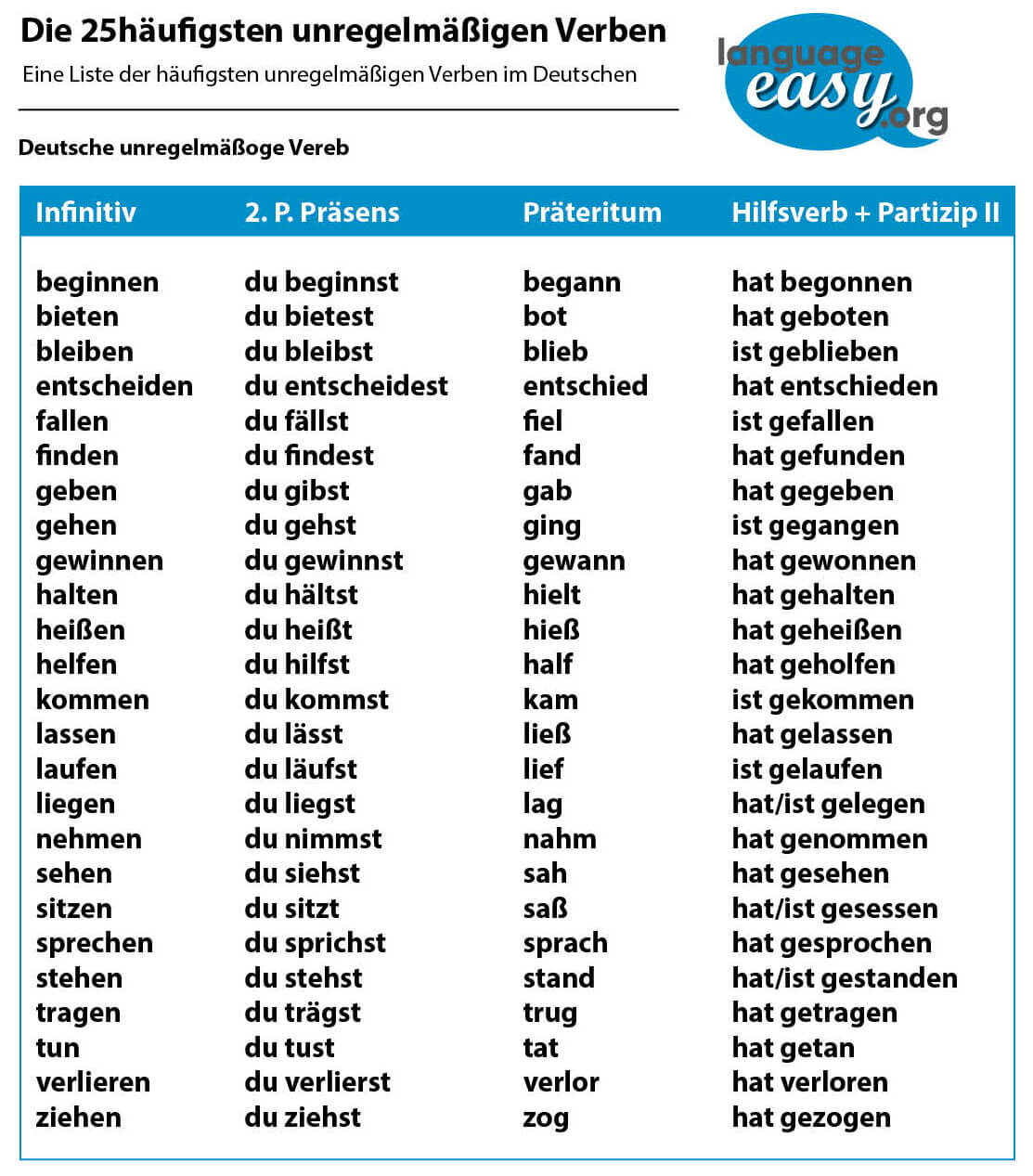
Die unregelmäßigen Verben Lerne Deutsch mit
Prepositions of time are used to answer the questions "when" or "for how long". 2. Unlike prepositions of place, they don't change the case. Each preposition of time is followed by one case only. For example, an and in (time) are always followed by the dative. an + dem = am in + dem = im. German uses three different prepositions, am, um and im.

Pin auf German A1.2
Salivia_Baker. Established Presence. Post August 25th, 2010 11:02 am. im is short for in dem. (like ins = in das) That means you use im when you use the dative when the subject is neuter or masculine. i.e. Sie ist im Haus. (She is in the house). Or Sie ist in dem Haus.

Die Adjektivdeklination im Nominativ. German grammar, Learn german, German language learning
1 answer. answered by. Joseph published. over 4 years ago. "Im" is simply the short form of "In dem" so we are talking about a dative. Both "in" and "im" are correct but which one is correct depends on the sentence and context . Wir sind in dem Kino (im Kino). We are at the cinema. Wir gehen in das Kino (ins Kino).

Pin page
Fahren: to drive, but also to go. Ins - in das - means that the destination is inside the theatre. Accusative is directional - going there. The combination of fahren and in is a bit confusing, but completely understandable. Sie fahren in dem Theater. This one uses dative - stationary. They are driving in the theatre.
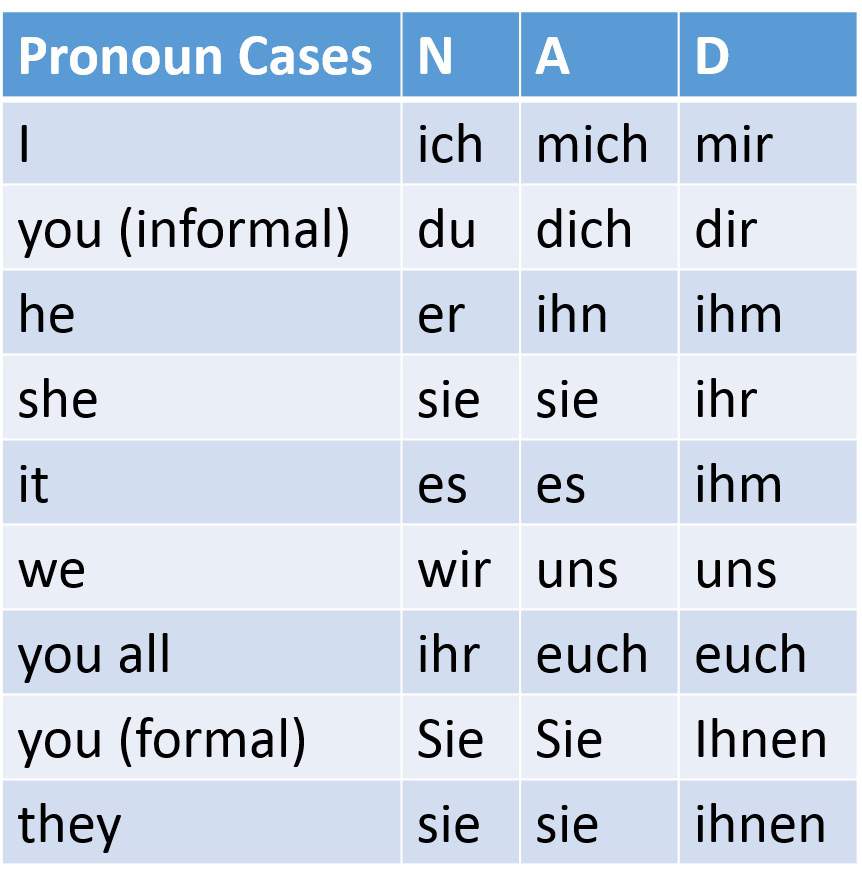
German Lesson 6 Akkusativ and Dativ Pronouns Language Exchange Amino
Get a FREE training on how to learn German effectively: https://www.happygerman.comFOLGE MIR: - FACEBOOK: https://www.facebook.com/LearnGermanWithAnja- INSTA.
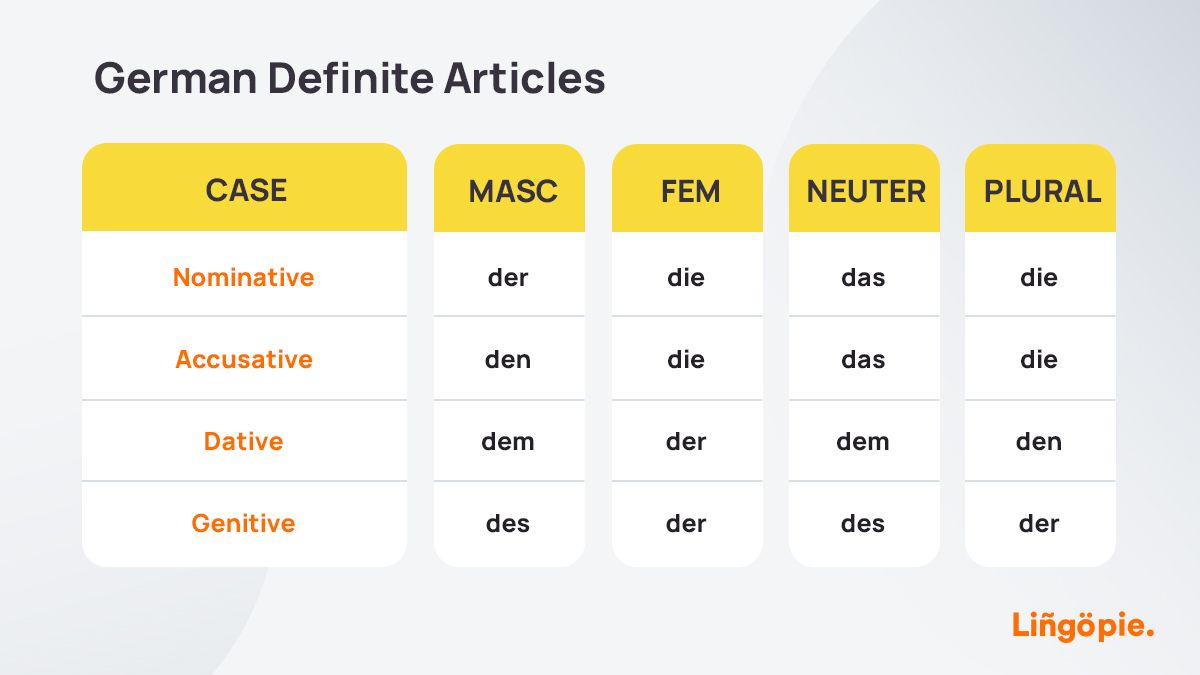
German Cases Simply Explained A Guide to German Cases [Grammar Guide]
GET EXERCISES FOR THIS VIDEO: http://www.patreon.com/easygermanSUBSCRIBE: http://goo.gl/sdP9nzLEARN GERMAN IN BERLIN: http://easygerman.org/#summerschoolFACE.

Free German A1 The Language Office
When talking about the time in general, you have to use im instead of in dem. This applys to seasons, except for when you talk about a season in a specific year. Im Frühling - in spring. Im Sommer - in summer. Im Herbst - in autumn. Im Winter - in winter. If you want to talk about a specific season in a specific year, you can use dem.
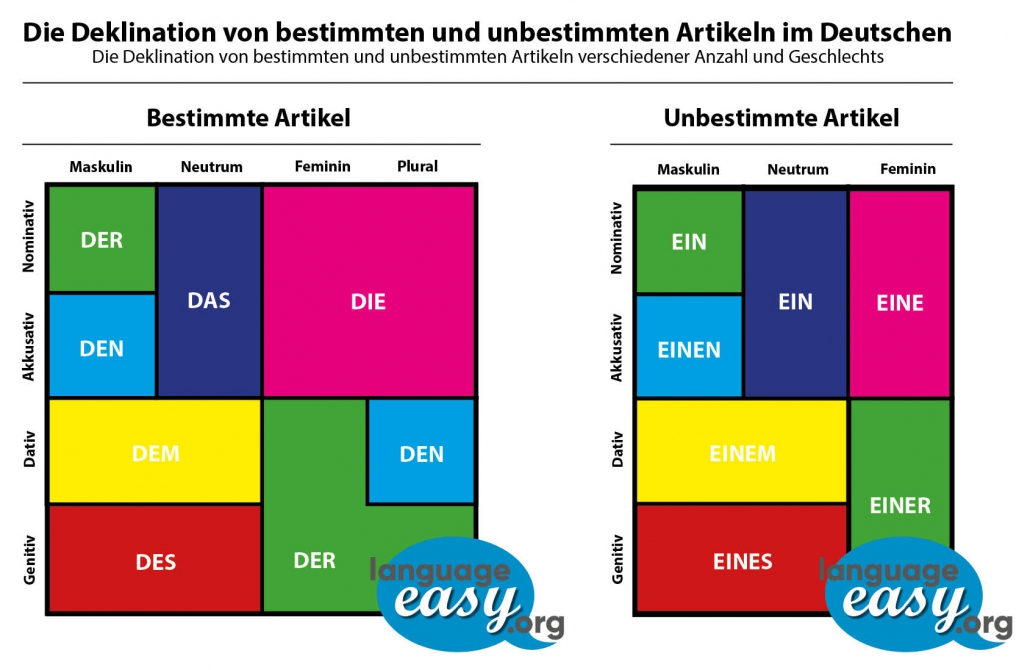
German Articles Learn German Grammar with
We use "um" when we talk about the exact time. Ich bin um 8 Uhr geboren. When we talk about years we don't need a preposition, so 'In 2006 I started Angelika's German' would just be '2006 began ich Angelika's German.'. Only if we talk about ancient, important years we use 'im Jahre', for example 'Goethe starb im Jahre.

Dativ Präpositionen German language learning, German language, Learn german
Wir arbeiten im Sommer viel. → We work a lot in summer. Im Herbst sind die Blätter bunt. → In autumn, the leaves are colorful. Months: Im Januar ist es oft kalt. → It is often cold in January. Im Juni sind die Tage lang. → In June the days are long. Im September habe ich viel Zeit. → I have a lot of time in September.

Pin von Péter Szigeti auf Good to know Deutsch lernen, Deutsch, Deutsch nachhilfe
zum / zur etc. zu is a dative preposition. This means that it always triggers the dative case. This makes it easy! Masculine and neuter are very similar, and both turn into dem in the dative case. If zu comes before a masculine or neuter noun, you get zu dem, which contracts to zum.
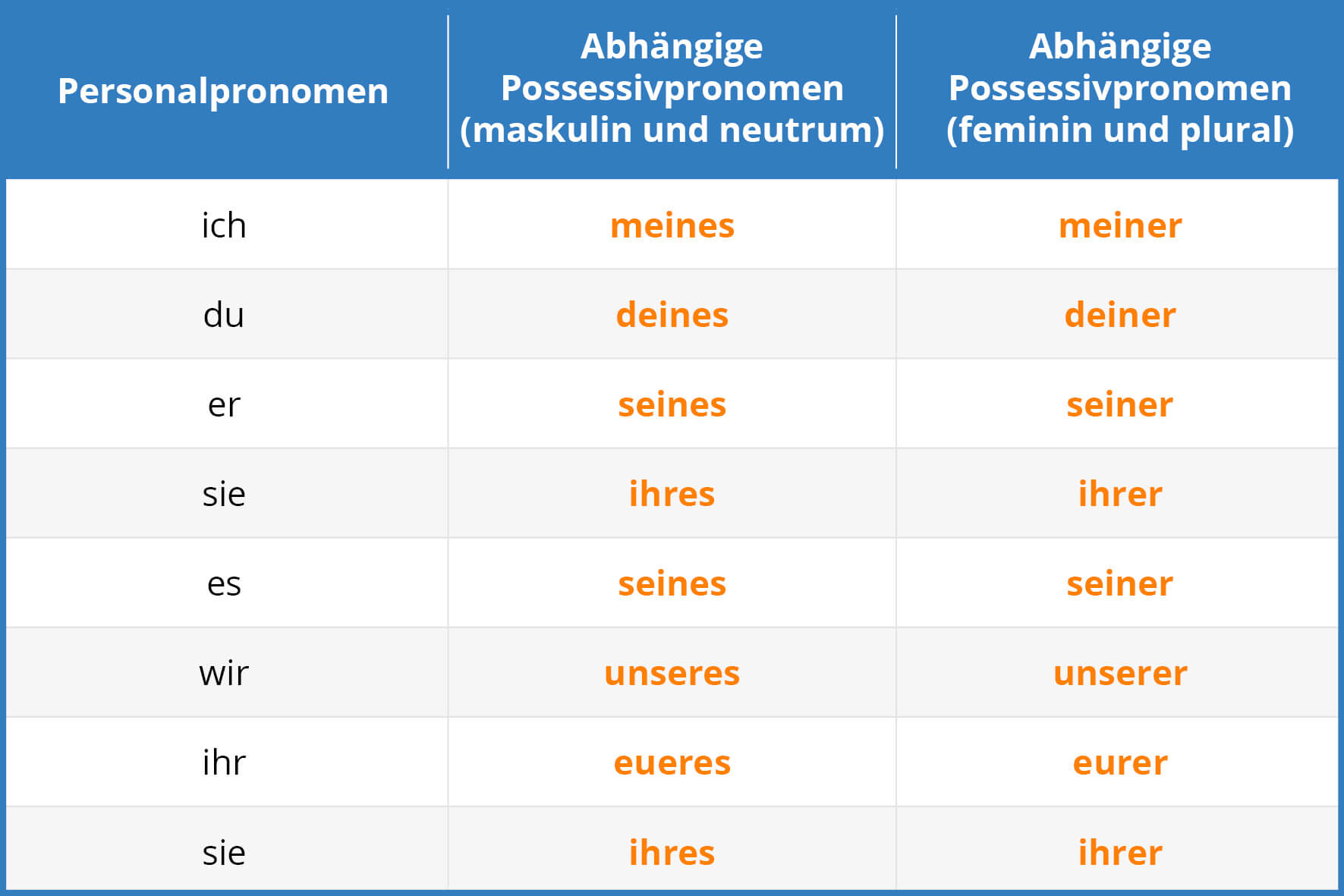
Der Genitiv im Deutschen Lerne Deutsch mit
My German teacher put it like this: Keep it short, that is, use the so called obligatory contractions, but she also mentioned that it is not a mistake to use an + dem instead of am, for example. I find the emphasizing mentioned below by AGuyCalledGerald a good argument for not being a mistake and also for the situation when you wouldn't want to.

How to use im, am or um in German? Let me explain! German language learning, Learn german
An. Means: at, to, up next to. Examples: Ich sitze an dem Tisch. (I am sitting at the table.) Die Frau ist an der Tankstelle. (The woman is at the gas station, as in she is literally standing up next to the vertical gas pump. It can be helpful to think about a side-by-side, vertical encounter to remember when to use "an" as in "up next to.")

Learn German Article's Der, Die or Das? In 6 Minutes German Deutsch YouTube
Ich lebe im Libanon. - I live in Lebanon. Ich lebe im Jemen. - I live in Yemen. c) with feminine country or city names. When you live in countries that require the feminine article in German, for example, Switzerland, Slovakia, or Turkey you have to use the preposition "in" plus the article "der". Ich lebe in der Schweiz. - I live.

German Sentences Learn German Sentences with
#LearnGermanOriginal #LearnGerman #GermanGrammarLearn German lessons online for beginners course - We help you learn german in a quick and easy way. Learn Ge.
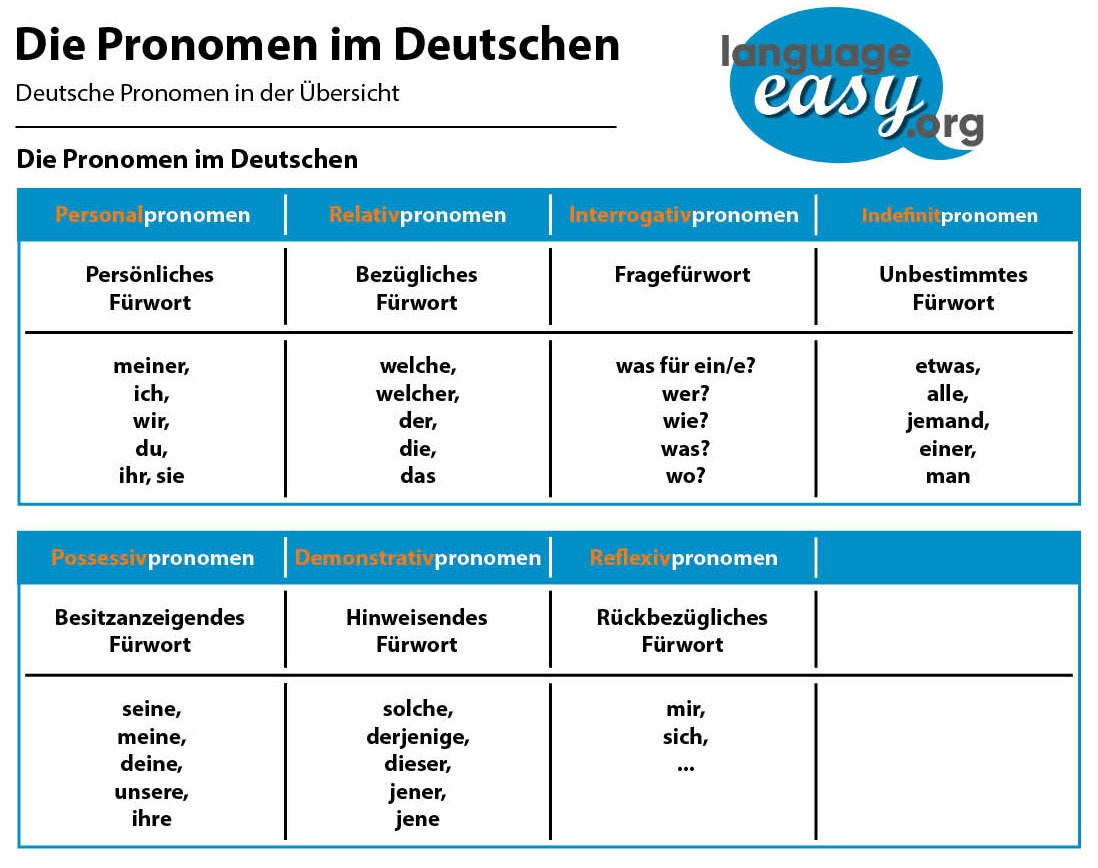
German Pronouns Learn German Pronouns with
The word im in German is short for in dem. The word in means in or into in English. So, just like in English, you would say I am in the café, but I am in London. At first glance, it can appear as though the words in & im are interchangeable, but that is not the case. While the two words may sound very similar, they actually have very different.

work with um, am and im in German YouTube
Clever Ways to Remember German Prepositions "Arrow" verses "Blob" Some find it easier to remember the accusative-versus-dative rule by thinking of the "accusative" letter A on its side, representing an arrow ( > ) for motion in a specific direction, and the dative letter D on its side to represent a blob at rest.